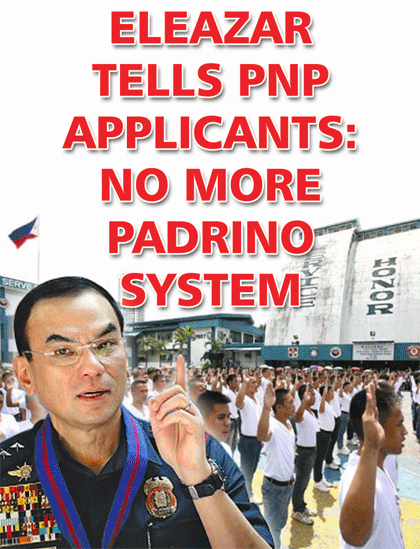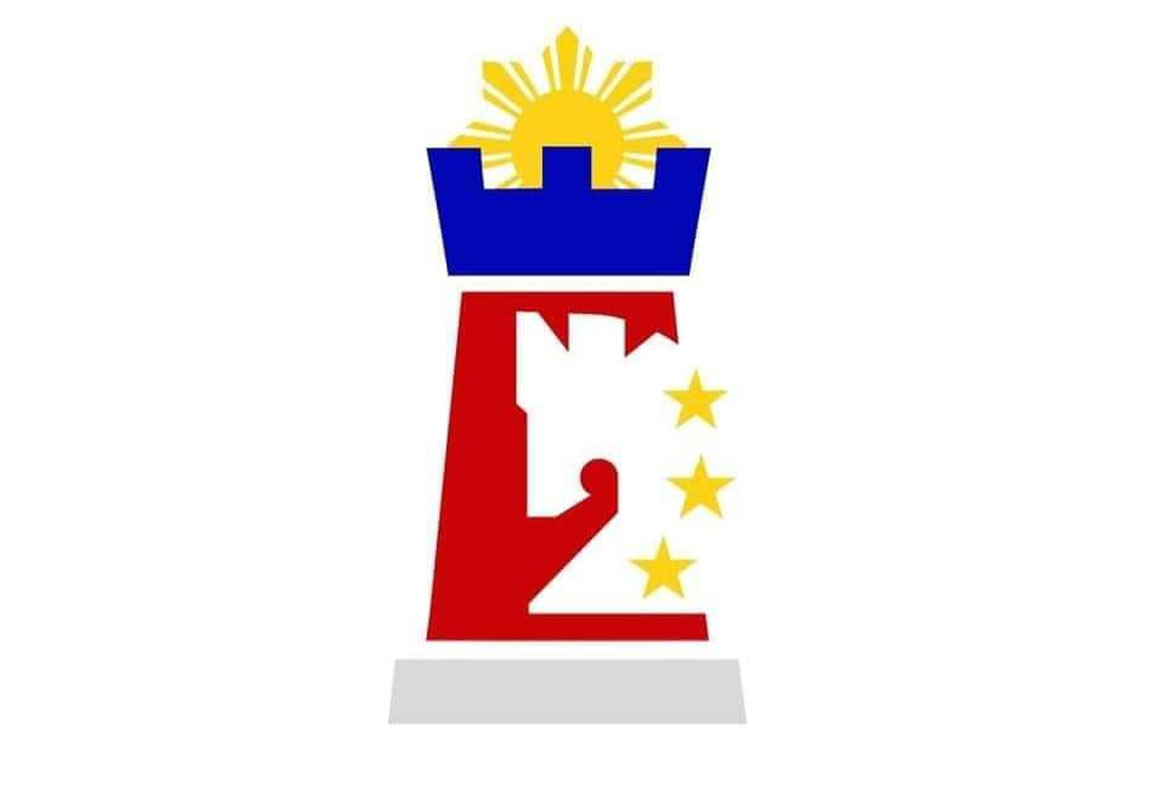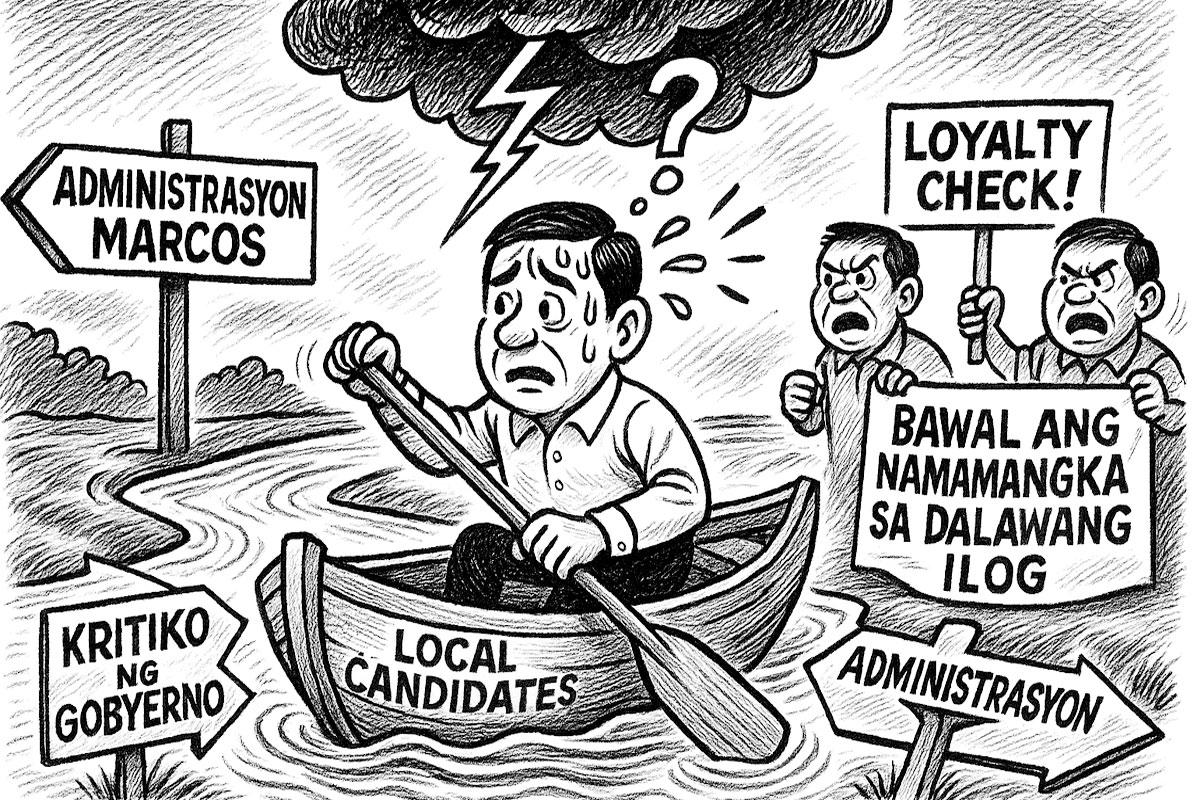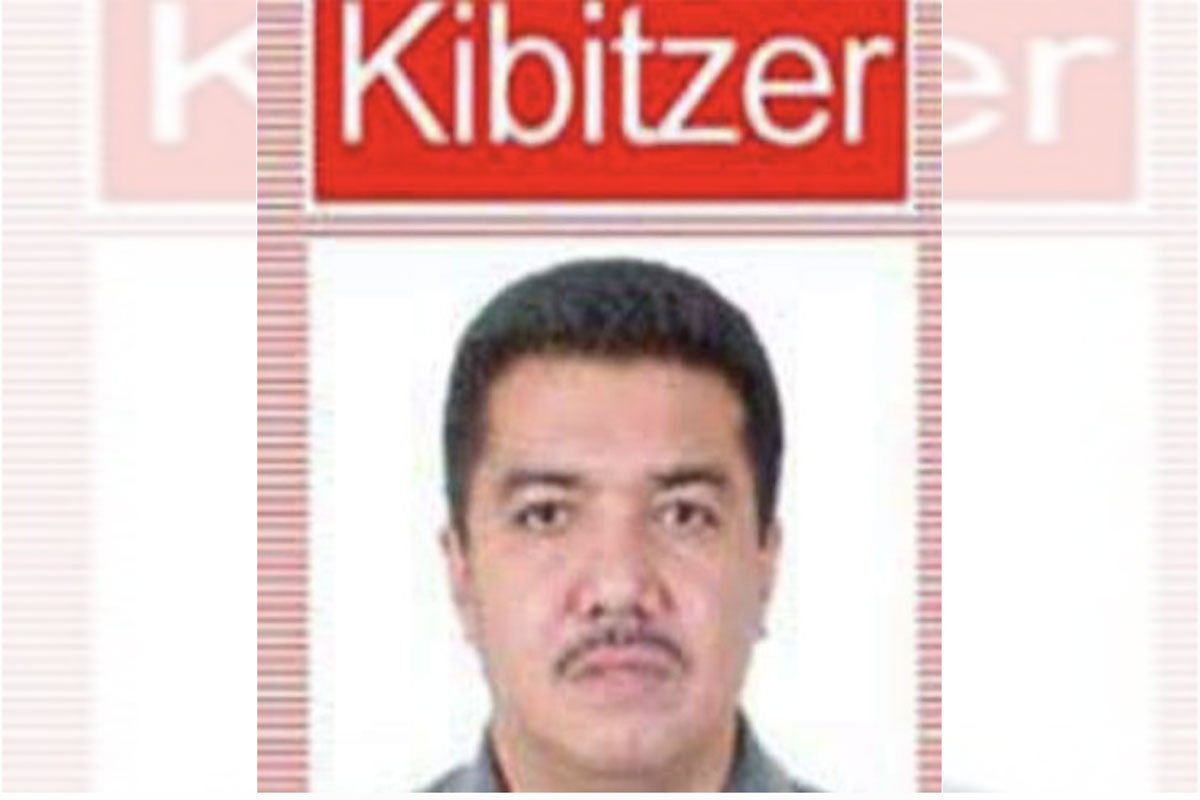
Eleazar tells PNP applicants: No more padrino system
 TO ensure that only the best and the brightest will be recruited and positioned into the Philippine National Police (PNP), its new chief, General Guillermo Lorenzo T. Eleazar has emphasized there would be no more ‘padrino system’ in the organization which is embarking on a massive transformation program,
TO ensure that only the best and the brightest will be recruited and positioned into the Philippine National Police (PNP), its new chief, General Guillermo Lorenzo T. Eleazar has emphasized there would be no more ‘padrino system’ in the organization which is embarking on a massive transformation program,
“Walang palakasan. Ngayon pa lang, humihingi na ako ng pasensya sa mga gustong makiusap, sa mga kasamahan natin sa PNP, sa mga retired senior police officer, sa aking mga kamag-anak at kaibigan. Pasensyahan na po, tatablahin ko kayo,” said the member of Philippine Military Academy ‘Hinirang’ Class of 1987.
The so-called ‘Padrino System’ has created a dent in the integrity of the PNP recruitment and placement and promotion system in the past. This has been the reason why a number of deserving police officials were unable to occupy key positions as they have no ‘political connections’ as they say.
The problem has also plagued the organization’s recruitment system. In some cases in the past, PNP applicants who have failed strict requirements such as the neuro-psychiatric test were able to enter the force after getting help from their benefactors, some of them politicians and retired police officials.
Eleazar said he really wants to put an end to the problem just like his predecessors.
“Tinutuwid na po natin ang kultura ng palakasan at padrino system sa recruitment na nagsilbing hadlang para makapasok ang iba pang mga qualified na aplikante. Bukas na bukas ang pintuan ng aming organisasyon para sa inyo,” he explained.
Members of the PNP have their own Code of Conduct and Ethical Doctrine. It says that each member of the force “must adhere to and internalize the enduring core values of love of God, respect for authority, selfless love and service for people, sanctity of marriage, and family life, responsible dominion and stewardship over material things, and truthfulness.”
There is also the so-called ‘delicadeza’ in the organization. It says that in consonance with the requirements of honor and integrity in the PNP, all members must have the moral courage to sacrifice self-interest in keeping with the time-honored principle of delicadeza.
The PNP code of conduct also says that “PNP members shall inhibit themselves from soliciting political patronage on matters pertaining to assignment, award, training and promotion” and at the same time “shall set a good example to their subordinates and follow good example from the superiors.”
The PNP chief strongly supports the PNP doctrine on ‘non-solicitation of patronage.’ It says that “PNP members shall seek self-improvement through career development and shall not directly or indirectly solicit influence or recommendation from politicians, high ranking government officials prominent citizens, persons affiliated with civic or religious organizations with regards to their assignments, promotions, transfer or those of other members of the force, nor shall they initiate any petition to be prepared and presented by citizens on their behalf. Moreover, they shall advise their immediate relatives not to interfere in the activities of the police service particularly in the assignment and reassignment of personnel.”
Eleazar said he is aware of how those who have “strong backers” are favored over the others—even as early as the recruitment stage.
When he was still the National Capital Region Police Office (NCRPO) director in 2019, the PNP chief implemented reforms in their recruitment system through quick response (QR) codes for applicants.
“Walang pangalan, walang mukha. Only their qualifications will be the basis for their evaluation. Our commander in chief, President Rodrigo Duterte has a marching order to continue the aggressive internal cleansing in the PNP. That is why we will implement a QR code system in all the phases of our recruitment process, nationwide so we can get the best qualified applicants for PNP,” he said.
According to the 26th PNP chief, police aspirants can become police officers solely on merit thru their QC Code System.
“Naging kalakaran na kasi na kung papasok ka ng PNP kailangan may kilala ka, otherwise baka ma-slash ka o hindi mapili,” he said.
Thru their ‘No Human Contact Policy’ in the recruitment of new policemen, the PNP has been able to prevent some erring personnel from altering the result of medical and neuro-psychiatric examinations.
When he was still the Metro Manila police chief, Eleazar instituted their Robust, Neuro-Psychiatric, Medical and Dental System (RONMEDDS) program which uses bar coding and consolidates in one database all the processes conducted for the applicants.
The system ensures that the applicant’s identity will remain a secret and he/she shall only be recognized through a unique bar code while undergoing recruitment processes which include measurement of height and weight, interviews, medical and dental exams up to the neuro-psychiatric and agility tests.
The program also ensures that the names of those who were already rejected in the past will not be able to reapply again in other police regional offices.
“Through this, there is no way that a disqualified police recruit would find a ‘padrino’ to alter the results of his/her examinations,” said Eleazar.
There have been lingering questions on how policemen who have committed suicide, killed people as if they were animals or even raped their daughters passed the supposed to-be very strict NP test.
Add to the problem the number of rookie cops who have been found to be involved in criminal activities right after they were given their guns and badges.
Eleazar is a seasoned police officer who has been feared by car thieves, robbers, rapists, kidnappers and drug traffickers since his junior days.
As an officer of the the PNP Traffic Management Group which is now known as the PNP Highway Patrol Group, he was instrumental in the neutralization of notorious carjacking and highway robbery groups contributing immensely to the PNP’s crackdown on organized crime syndicates.
He also served as chief of the San Pedro police station in Laguna and commanded the Batangas and Laguna Criminal Investigation and Detection Group. He went on to head the investigation division of the Police Anti-Crime and Emergency Response which is now known as the PNP Anti-Kidnapping Group where he figured prominently in the neutralization of some of the country’s most notorious kidnapping-for-ransom groups.
Eleazar also commanded the PNP Anti-Cybercrime Group, the Quezon City Police District, the Police Regional Office 4-A in Calabarzon region and NCRPO.





















